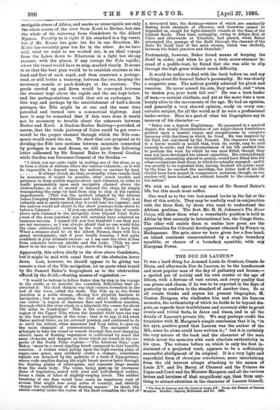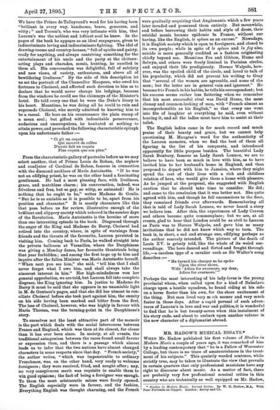THE DUO DE LAUZUN.*
IT was a hard thing for Armand Louis de Gontaut, Comte de Biron, and afterwards Duc de Lauzun, to be the handsomest and most popular man of the day of gallantry and license,— a spoiled pet of society and his own master at the age of fifteen, with a fortune of vast extent, and every quality that can please and charm, if he was to be expected in the days of posterity to conform to the standard of another time, So at all events thinks and argues his present biographer, M. Gaston Maugras, who vindicates him and even his famous memoirs, the authenticity of which he holds to be beyond dis- pute, as regards their truthfulness and accuracy alike in great- events and trivial facts, in dates and times, and in all the details of Lauzun's private life. We may perhaps credit the translator with M. Maugras's simple conclusion that it is, "ink his eyes, positive proof that Lauzun was the author of the MS., since he alone could have written it ; " but it is certainly the very nature of the book and the character of the man which invest the memoirs with such absolute authenticity in his eyes. The volume before us, which is only the first in- stalment of a projected work, appears to be a sufficiently successful abridgment of its original. It is a very light and superficial form of chronique scandaleuse,, more entertaining from the old interest always attaching to the names of Louis XV. and Da Barry, of Choiseul and the Princes de- Ligne and Conti and the Minister Maupeou, and all the various heroes and heroines of that magnificent age, than from any- thing to attract attention in the character of Lauzun himself.
• The Duo de Leman and the Court of Louis XV. From the French of Gaston. Mangras. London: Osgood, ?Salvable, and Co. 1885.
We have the Prince de Talleyrand's word for his having been "brilliant in every way, handsome, brave, generous, and witty ; " and Tersen's, who was very intimate with him, that Lauzun's was the noblest and loftiest soul he knew. In the pages of the book be appears as an ideal scapegrace, given to indiscriminate loving and indiscriminate fighting. The idol of drawing-rooms and country-houses," full of spirits and gaiety, ready for anything, and always contriving something for the entertainment of his uncle and the party at the chateau : acting plays and charades, music, hunting, he excelled in them alL His conversation was delightful, full of subtlety and new views, of variety, enthusiasm, and above all of bewildering liveliness." By the side of this description let us set the portrait of the Chancellor Maupeou, who owed his fortunes to Choiseul, and affected such devotion to him as to declare that he would never change his lodgings, because from the windows he could see the chimneys of the Minister's hotel. He told every one that he wore the Duke's livery in his heart. Meantime, he was doing all he could to ruin and supersede Choiseul, who merely admitted to knowing him to be a rascal. He bore on his countenance the plain stamp of a mean soul ; but gifted with indomitable perseverance, audacious and unscrupulous, he hesitated at nothing to attain power, and provoked the following characteristic epitaph upon his unfortunate father :—
" Ci git un coquin
Qui mourut de colere D'avoir fait un coquin Plus coquin que son pere."
From the characteristic gallery of portraits before us we may select another, that of Prince Louis de Rohan, the nephew and coadjutor of Cardinal de Rohan, famous in connection With the diamond necklace of Marie Antoinette. "If be was not an edifying priest, he was on the other hand a fascinating gentleman. He had a most pleasing face, with liveliness, grace, and matchless charm ; his conversation, indeed, was frivolous and free, but so gay, so witty, so animated ! He is nothing that he ought to be," writes Madame de Genlis.
"But he is as amiable as it is possible to be, apart from his position and character." It is mostly characters like this that pass before us for review, illustrative enough of the brilliant and slippery society which ushered in the sombre days of the Revolution. Marie Antoinette is the heroine of more than one interesting episode in the book. Disgraced through the anger of the King and Madame du Barry, Choiseul had retired into the country, where, in spite of warnings from friends and the threats of the favourite, Lauzun persisted in visiting him. Coming back to Paris, he walked straight into the private ballroom at Versailles, where the Dauphiness was giving a Monday dance, her favourite theatricals being that year forbidden ; and among the first to go up to him and inquire after the fallen Minister was Marie Antoinette herself. "When next you see him," she said, "tell him that I shall never forget what I owe him, and shall always take the sincerest interest in him." Her high-mindedness won her general approbation, we are told, but Lauzun fell into complete disgrace, the King ignoring him. In justice to Madame du Barry it must be said that she appears in no unamiable light in M. de Gontaut's pages, and that she did her utmost to con- ciliate Choiseul before she took part against him, the enmity on his side having been marked and bitter from the first. The loss of Choiseul, however, who was highly in favour with Maria Theresa, was the turning-point in the Dauphiness's story.
To ourselves not the least attractive part of the memoir is the part which deals with the social intercourse between France and England, which was then at its closest, far closer than it has ever been since. In society, at all events, the traditional antagonism between the races found small favour or expression then, and there is a passage which almost leads us to infer that the two nations have almost changed characters in some respects since that day. "French society," the author writes, "which was impenetrable to ordinary Frenchmen, was, on the other hand, very ready to welcome foreigners ; they were received, feted, and sought after ; nay, no very conspicuous merit was requisite to enable them to win good opinions; the fact of being a foreigner was enough. To them the most aristocratic salons were freely opened. The English especially were in favour, and the fashion. Everything English was thought charming, and the French
were gradually acquiring that Anglomania which a few years later invaded and possessed them entirely. But meanwhile, and before borrowing their habits and style of dress, their suicidal mania became epidemic in France, without our having, like the English, le spleen as an excuse." Nowadays, it is English society which is open to foreigners, and closed to its own people; while in spite of le spleen and la fog also, suicide is more generally credited as a fashion originating chiefly beyond sea. Meantime Fox and Gibbon, Hume and Selwyn, and others were freely lionised in Parisian circles, and enjoyed their life prodigiously. Horace Walpole, how- ever, was the spoiled child of the circle, and loved to talk of his popularity, which did not prevent his writing to Gray that "several of the women are agreeable, and some of the men ; but the latter are in general vain and ignorant." He became his French in his habits, he tells his correspondent; but his success seems rather less flattering when we remember that his most successful rival was David Hume, the most clumsy and common-looking of men, with "French almost as incomprehensible as his English," so that every one went into fits of laughter at everything he said, even without hearing it, and all the ladies must have him to assist at their toilet.
The English ladies came in for much record and much praise of their beauty and grace, but we cannot help questioning M. Maugras's word for the authenticity of the Lauzun memoirs, when we find the best of them all figuring in the list of his conquests, and introduced apparently for little purpose besides. The beautiful Lady Sarah Banbury, famous as Lady Sarah Lennox, we are to believe to have been so much in love with him, as to have invited him to her husband's home in England, and then proposed to depart with him to Jamaica, where they might spend the rest of their lives with a rich and childless relation of hers, who would give them a home with pleasure. As he jumped at the proposal, she suggested with English caution that he should take time to consider. He did ; and came to the conelusion that it was better not. She quite agreed with him, and though he fell unconscious to the floor, they remained friends ever afterwards. Remembering all that is told of Lady Sarah Lennox, we never heard a story we believe less. After this, the experiences of Lady Craven and others become quite commonplace; but we are, at all events, glad to hear that London could be as civil to Lauzun as Paris was to Horace Walpole, and gave him so many invitations that he did not know which way to turn. The book is, in short, a sad and strange one, edifying perhaps as the author scarcely intended. The picture of the death of Louis XV. is grimly told, like the whole of its weird sur- roundings. The hero danced and flirted and fought through life,—a careless type of a cavalier such as Sir Walter's song describes :—
" He turned his charger as he spoke
Upon the river shore,
With Adieu for evermore, my dear,
Adieu for evermore.'"
Perhaps the most interesting of his lady-loves is the young provincial whom, when called upon for a kind of Balaclava. charge upon a hostile squadron, he found riding at his side on a horse fleeter than his own, for the sheer excitement of the thing. But men lived very m tch sooner and very much faster in those days. After a rapid perusal of such adven- tures of Lauzun's in love and war and politics,-it is wonderful to find that he is but twenty-seven when this instalment of his story ends, and about to embark upon another volume in the new character of a diplomatist abroad.



















































 Previous page
Previous page